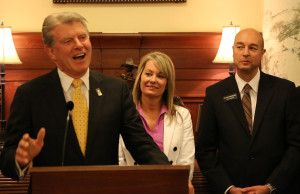Surrounded by leaders of the state’s education groups and members of both political parties, Gov. Butch Otter on Thursday signed the $125.5 million career ladder teacher salary bill into law.

When Otter put pen to paper, in front of a standing-room only crowd in his Statehouse office, it marked a milestone in a three-year journey to address teacher pay and retention issues. The career ladder topped the list of 20 reform recommendations issued in 2013 by Otter’s Task Force for Improving Education.
Over five years, the career ladder is designed to give all teachers a raise every year – starting with a $33.5 million boost in state funding in 2015-16.
“This is a historic day, as it should be,” Otter said. “There was a lot of heavy work and heavy lifting done by a lot of different folks. I can’t tell you how grateful I am to the Legislature … for the cooperation … and stick-to-it-iveness.”
Upon full implementation in 2019-20 – if the Legislature provides full funding – the career ladder would bump teacher pay levels to:
- Residency teachers in their first three years in the profession: $37,000 to $39,000.
- Professional teachers with more that three years experience: $42,500 to $50,000.
The minimum teacher salary set by law for this school year is $31,750. That jumps to $32,700 next year (a 2.9 percent increase) and $37,000 by 2019-20 (a 16.5 percent increase from current levels).
Otter called the career ladder “probably the biggest achievement in education” that he has seen in his political career, which started in the 1960s as a legislative attaché.
“I declare this session really historic,” Otter said. “I don’t ever remember, in 14 years as lieutenant governor and eight now as governor, I don’t ever remember a legislative session that was so focused on, by both sides of the aisle and both sides of the rotunda, on the future.”
While raising minimum teacher salaries is a major aspect of the career ladder, the plan also gives more experienced teachers raises as well.
For example, a teacher with between four and nine years of experience would enter the career ladder at the professional rung next year, without having to advance through the residency rung. The state would provide $35,498 in state funding for salaries next year. That would jump to $38,758 the following year, representing a raise of more than 9 percent. By the following year, 2017-18, those teacher would earn $41,155, through another raise of 6.2 percent.
Just as today, salaries will continue to be negotiated annually between local school districts and their teachers’ union or bargaining agent.
The career ladder now enjoys unanimous backing from the major education groups, but the bill’s architects traversed a bumpy road on the way to building consensus. The proposal was negotiated through weeks of small-group meetings between lawmakers, state officials and education groups. The first version of the bill did not surface until the 52nd day of the legislative session, when the Idaho Education Association and members of both political parties expressed concerns with it. Things got so rough that Rep. Ilana Rubel, D-Boise, described the first hearing on the original, unpopular career ladder bill as “the pitchfork hearing.”
“We were at an impasse, with people talking past each other, as usual,” said House Speaker Scott Bedke, R-Oakley.
The first two versions were shelved and revised in an effort to build support.

Idaho Education Association President Penni Cyr said the tide of opposition turned, in part, because teachers were given a seat that the table and their concerns were reflected in the revisions.
The statewide teachers’ union had opposed a related plan for tiered licensure and the career ladder since at least May of 2014, when a State Board of Education implementation subcommittee developed the career ladder framework.
Cyr said teachers still hold some concerns, and would like to see salaries reach the $40,000/$50,000/$60,000 levels that were originally proposed.
“We’ve talked about process, process, process all along,” Cyr said. “When we finally got down to talking to each other and listening to the teachers who this impacts the most, the people who work directly with our children, then we were able to reach some things.”
On Thursday, Otter and Superintendent of Public Instruction Sherri Ybarra made a public commitment to support the career ladder through implementation and find the funding to pay for it.
“That was extremely important because we know in the past many mandates from the Legislature have not been funded,” Cyr said. “With that commitment from the governor, our teachers will feel a lot better about that fact that this plan should and will be funded for the next five years.”
